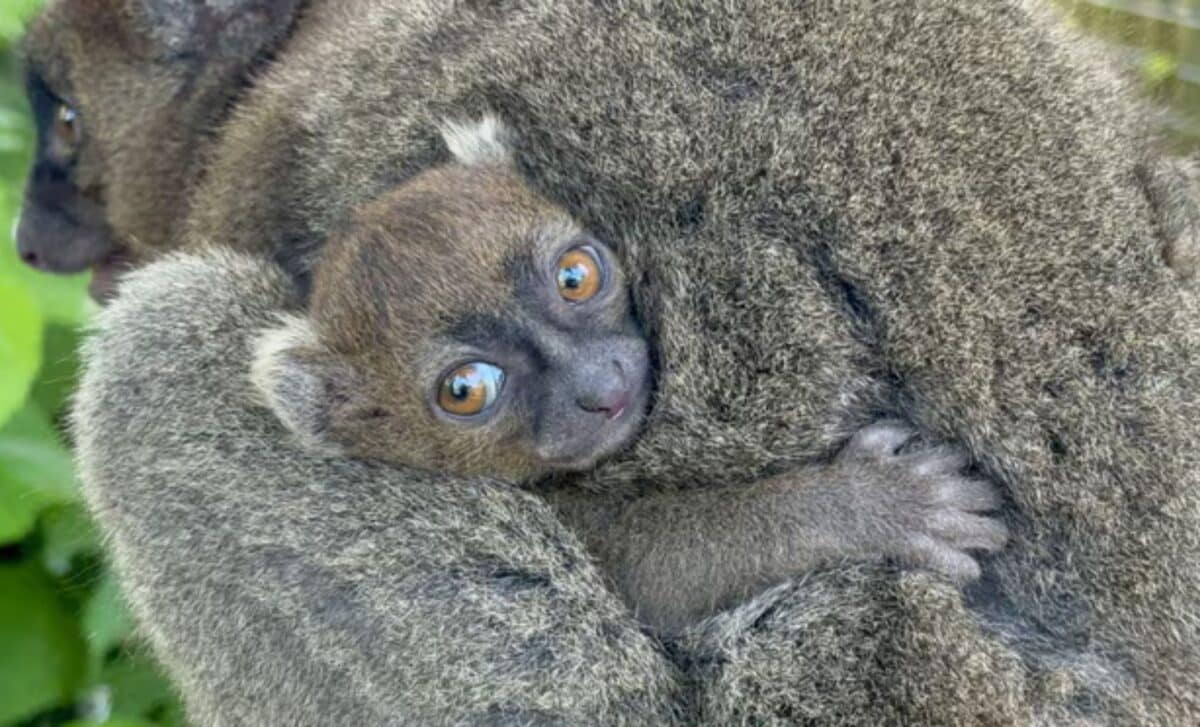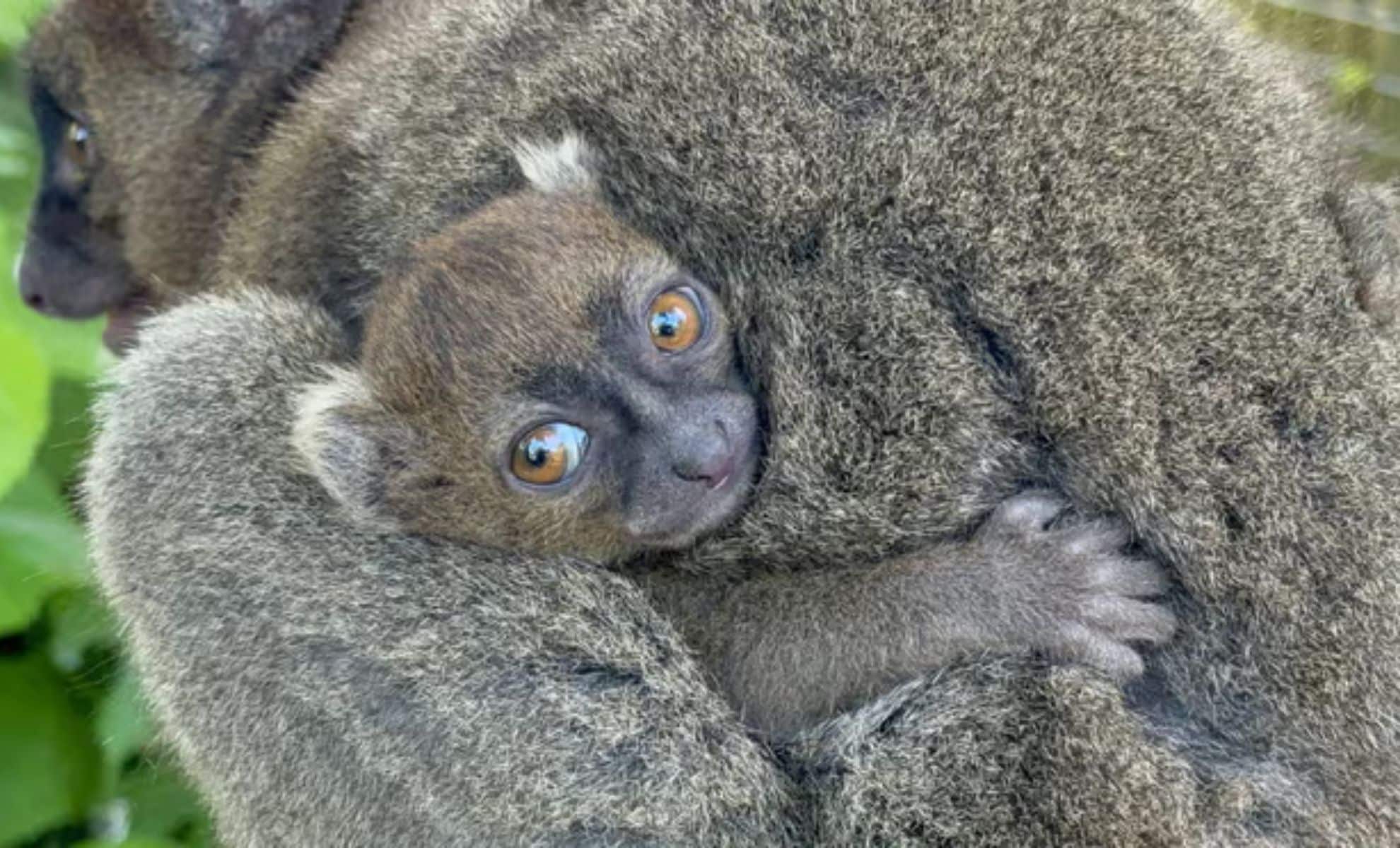Cotswold Wildlife Park in Oxfordshire has successfully bred a critically endangered greater bamboo lemur, marking a rare conservation achievement. The park is one of only two locations worldwide to breed the species in 2024, and the new arrival offers hope for the future of this species, which faces significant threats due to habitat destruction in Madagascar.
Cotswold Wildlife Park Celebrates Rare Birth of Critically Endangered Lemur

In a significant achievement for global conservation efforts, Cotswold Wildlife Park in Oxfordshire has successfully bred a greater bamboo lemur—one of the world’s most critically endangered primates.
This rare birth is not only a milestone for the park but also a beacon of hope for the survival of the species, which faces severe threats in its native habitat of Madagascar. With fewer than 36 greater bamboo lemurs in captivity globally, this new arrival is a critical step in preserving the species.
A Crucial Conservation Success Story
The baby lemur, born to Raphael and Bijou, represents the fourth consecutive year that Cotswold Wildlife Park has successfully bred these critically endangered primates. The park is now the only zoological collection in the UK to have achieved such a breeding success in 2024, and one of just two globally. The arrival of the lemur is particularly significant because breeding greater bamboo lemurs in captivity is exceptionally rare. According to Jamie Craig, general manager of Cotswold Wildlife Park, the birth highlights the ongoing challenges faced by the species in the wild.
“Lemur species in Madagascar are under tremendous pressure from habitat destruction and the rapidly rising human population,” Craig said. “It is vital that we raise awareness for this unique group of primates before it is too late.” His words reflect the urgency of conservation efforts, as these lemurs face extinction primarily due to habitat loss caused by deforestation, illegal logging, and the expansion of agriculture in Madagascar.
The greater bamboo lemur is highly specialized, relying almost entirely on bamboo as its primary food source. This dependency makes it particularly vulnerable when its forest habitat is cleared. The International Union for Conservation of Nature (IUCN) lists the species as critically endangered, and without intervention, their numbers in the wild could continue to plummet. Cotswold Wildlife Park’s success in breeding the species is therefore seen as a crucial lifeline for its survival.
Raising Awareness and Fostering Conservation
The birth of the baby lemur is not just a victory for Cotswold Wildlife Park but also for the wider international community committed to the conservation of endangered species. The park plays an active role in a European Breeding Programme, designed to ensure the long-term survival of species like the greater bamboo lemur by maintaining genetic diversity within captive populations. This program is essential for managing breeding efforts across zoos and wildlife parks, offering a backup population that can serve as an insurance policy against extinction in the wild.
In addition to its role in captive breeding, Cotswold Wildlife Park is deeply involved in in-situ conservation projects in Madagascar. The park helps fund and support important conservation sites in the lemurs' natural habitat, and partners with various organizations to protect critical ecosystems. As Craig noted, “At Cotswold Wildlife Park, we are committed to conserving this species and we fund an extremely important site in Madagascar, as well as participating in several other conservation projects with the Cotswold Wildlife Park Conservation Trust.”
The new lemur, which is still too young to be named or sexed, can now be seen exploring its surroundings in the park’s Madagascar exhibit. The park hopes that visitors will be inspired to learn more about the plight of these animals and contribute to ongoing conservation efforts. In Craig’s words, “We are extremely privileged to keep both of these species at the park. They are extremely rare in captivity, and they are fantastic ambassadors for our fundraising efforts.”
The Greater Bamboo Lemur: A Species on the Brink
The greater bamboo lemur, native to the rainforests of Madagascar, is one of the most critically endangered lemurs in the world. Once widespread across the island, their population has been decimated by habitat destruction. As human populations in Madagascar grow, agricultural practices expand, and logging operations intensify, the lemur’s bamboo forests have steadily disappeared. This has pushed the species to the brink of extinction, with only a few hundred individuals remaining in the wild today.
In captivity, maintaining and breeding the species is particularly challenging due to their specific dietary requirements. Greater bamboo lemurs rely almost exclusively on bamboo shoots, which contain a chemical called cyanide—toxic to many animals but tolerable to the lemurs in small amounts. This highly specialized diet makes them difficult to care for in captivity, further complicating conservation efforts. However, successful breeding programs like those at Cotswold Wildlife Park provide hope that captive populations can be sustained and potentially reintroduced to the wild in the future.
Conservationists hope that increased awareness and continued international cooperation will help protect the remaining bamboo forests in Madagascar and secure a future for the species. As habitat destruction shows no sign of slowing, the role of zoos and wildlife parks in conserving endangered species becomes even more critical.
A Vital Role in Global Conservation Efforts
Cotswold Wildlife Park’s successful breeding of the greater bamboo lemur is a powerful reminder of the role zoos and wildlife parks play in global conservation. While captive breeding programs are not a permanent solution, they serve as an essential tool for preserving species at risk of extinction in the wild. For species like the greater bamboo lemur, which face overwhelming pressures in their natural habitat, these programs offer a critical safety net.
The park’s commitment to conservation goes beyond just the care of animals in captivity. By funding projects in Madagascar, Cotswold Wildlife Park contributes to the preservation of biodiversity and the protection of endangered species in their native environments. Craig’s emphasis on fundraising efforts underscores the importance of public engagement in supporting these initiatives: “They are fantastic ambassadors for our fundraising efforts.”
The greater bamboo lemur serves as a poignant symbol of the fragility of the natural world and the urgent need for action to preserve endangered species. As more people visit Cotswold Wildlife Park and learn about the challenges facing species like the greater bamboo lemur, the hope is that they will be inspired to support conservation efforts both at home and abroad.



